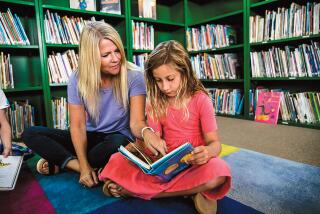Students Need an Introduction to Classic Works
- Share via
“Read the best books first, or you may not have a chance to read them at all.”
--Henry David Thoreau
*
Though most high school course descriptions still call for a heavy dose of classic literature, teachers--particularly teachers who care a great deal about making school meaningful for their students--seem increasingly reluctant to tackle these works.
Assuming contemporary novels will be more accessible and less daunting for reluctant readers, they have abandoned “Great Expectations” and “The Scarlet Letter.” Rather than have students read Shakespeare’s play, teachers wheel out the VCR and show Leonardo DiCaprio as Romeo. While young adult literature and big-screen adaptation have a place in the reading and viewing lives of today’s teenagers, the work of a literature classroom should be the careful reading of challenging texts.
All too many schools reserve the classics for honor students. Ignoring the elitism that such a decision betrays, teachers defend a watered-down reading list for non-honors students by explaining that most teenagers simply can’t negotiate the difficult vocabulary and complex syntax found in most classics. Besides, they argue, today’s kids won’t read anything that is old. In an effort to provide students with literature they can “relate to,” teachers choose works that students actually don’t need much help reading.
Russian psychologist Lev Vygotsky believed that teachers should always work in what he called the “zone of proximal development.” Vygotsky felt that the only good kind of instruction is that which marches ahead of development and leads it. If students can read a book on their own, there is little reason to work through it chapter by chapter in class. Classroom texts should pose intellectual challenges that require the intervention of a teacher. As students gain command of the author’s text, the teacher--bit by bit--steps away and helps students to proceed independently.
Apart from a rare few, the young people I teach do not pick up classics with much enthusiasm. At first they groan, “Three hundred pages of poetry!” and moan, “I can’t do it. Not one word of what I read last night makes sense.” They always hope that if they complain enough, I will abandon the “The Odyssey” or “Beowulf” for something simpler.
Instead I promise to show them how to unlock the epics for themselves. Does every student manage to accomplish this with every book? Of course not. But many students who never expected to be able to read a difficult text find that, with a little help from their teachers and classmates, the book isn’t as indecipherable as they first thought.
Not many students pick up “Beloved” or “Crime and Punishment” on their own. And yet they need these stories badly. Reading Toni Morrison and Feodor Dostoevski makes students stronger readers and stronger people. If we care about kids, we teachers can’t give up just because the books are difficult.
More to Read
Sign up for our Book Club newsletter
Get the latest news, events and more from the Los Angeles Times Book Club, and help us get L.A. reading and talking.
You may occasionally receive promotional content from the Los Angeles Times.








